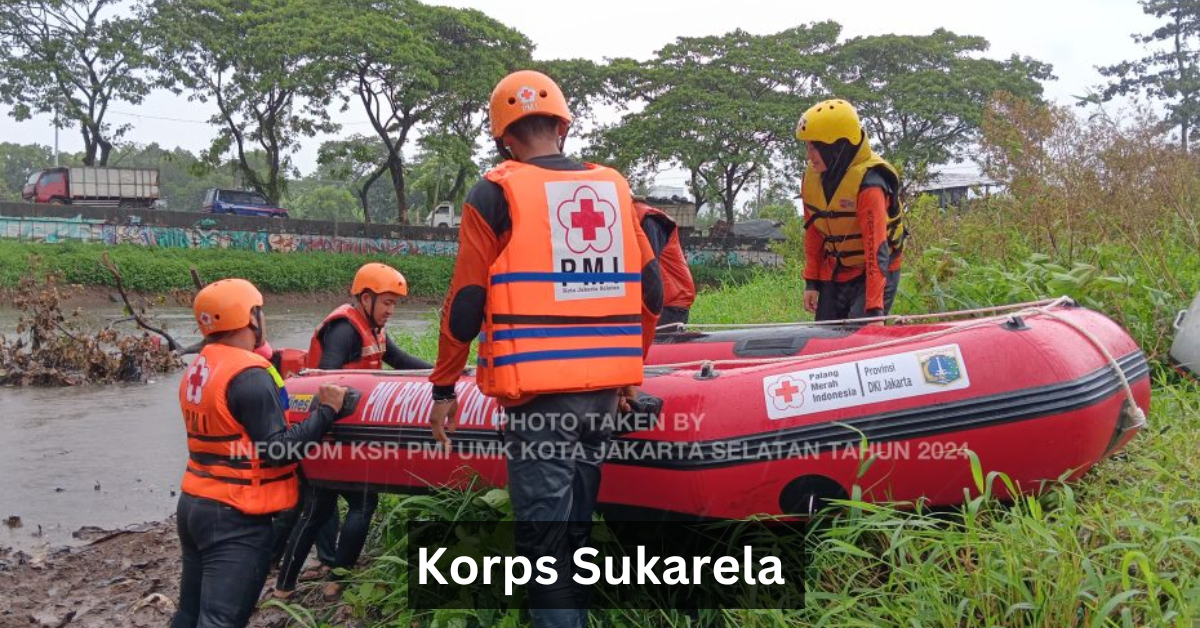Korps Sukarela is a volunteer corps in Indonesia that engages individuals in social, humanitarian, and disaster response activities. In Indonesia, Korps Sukarela—or Volunteer Corps—represents this spirit, empowering individuals to contribute to their communities, especially in times of crisis. This article explores the concept, history, organizations, challenges, and significance of Korps Sukarela in Indonesia, demonstrating its profound impact on society.
At its core, Korps Sukarela refers to organized volunteer groups that provide selfless assistance to communities in need. These volunteers engage in various social causes, from disaster relief to educational outreach and humanitarian aid. In Indonesia, Korps Sukarela plays a vital role in shaping the nation’s response to emergencies and fostering long-term community development.
In a country as vast and diverse as Indonesia, the presence of a volunteer corps is indispensable. Indonesia’s history is rich with instances where volunteer groups have stepped up during national crises, such as natural disasters, humanitarian emergencies, and health crises like the COVID-19 pandemic. Korps Sukarela helps to bridge the gap in public services, ensuring that assistance reaches the most vulnerable populations, especially in rural areas and disaster-prone regions like Aceh or Yogyakarta.
What is Korps Sukarela?
A Deep Dive into the Concept
The term Korps Sukarela is derived from Indonesian, meaning “volunteer corps.” These organizations are composed of individuals who willingly dedicate their time, skills, and resources to the betterment of society. The volunteers are often coordinated by non-governmental organizations (NGOs), local community groups, or even the government. They perform tasks ranging from bantuan kemanusiaan (humanitarian aid) to organizing kerja sosial (social work) in both urban and rural communities.
The Role of Volunteers in Society
Volunteers are the backbone of Korps Sukarela. They assist in critical functions that governments and organizations might otherwise struggle to meet. In Indonesia, volunteers play a key role in disaster preparedness, community education, health outreach, and social cohesion. The collective work of these volunteers promotes solidarity, helping to strengthen the nation’s social fabric.
History of Korps Sukarela in Indonesia
Origins and Evolution
The concept of Korps Sukarela is not a new one in Indonesia. It traces its roots back to the Independence Struggle, where groups of volunteers supported the war efforts against colonial forces. Over time, the role of volunteers expanded to include community and social service initiatives. Today, Korps Sukarela is formalized and organized through various institutions, ranging from educational and civic organizations to NGOs and government agencies.
Key Milestones and Achievements
One of the key milestones in the history of Korps Sukarela is the establishment of Palang Merah Indonesia (PMI), the Indonesian Red Cross, which has been instrumental in mobilizing volunteers for disaster relief, blood donation drives, and health education campaigns. Another significant development was the formation of Tagana, a disaster response volunteer organization that has played a crucial role during major natural disasters like the 2004 Indian Ocean tsunami and the 2018 Lombok earthquake.
Key Organizations Behind Korps Sukarela
Palang Merah Indonesia (PMI)
PMI is one of the largest and most prominent organizations managing Korps Sukarela in Indonesia. Established in 1945, PMI coordinates disaster response efforts, medical assistance, blood donation drives, and other humanitarian activities. Volunteers in PMI are highly trained in disaster management, first aid, and emergency response, and they contribute to both local and international relief efforts.
Pramuka (Indonesian Scouts)
Another key player in the Korps Sukarela system is the Pramuka movement, Indonesia’s scouting organization. Pramuka is known for fostering leadership, teamwork, and community service among young people. Scouts regularly participate in kegiatan sosial (social activities), including environmental conservation efforts, disaster relief, and educational outreach in rural villages.
Other Notable Volunteer Organizations
Other organizations such as Aksi Cepat Tanggap (ACT), Dompet Dhuafa, and UN Volunteers (UNV) also play crucial roles in coordinating volunteer efforts in Indonesia. These organizations focus on large-scale humanitarian projects, from providing food and medical aid during natural disasters to offering sustainable development solutions in remote areas.
How to Become a Member of Korps Sukarela
Eligibility Requirements
Joining Korps Sukarela is open to all individuals who are passionate about making a difference in their communities. While each organization has its own criteria, generally, volunteers should be physically fit, have a willingness to serve, and a strong sense of social responsibility. For example, PMI volunteers are expected to undergo rigorous training in disaster management and first aid.
Registration and Application Process
The registration process typically involves submitting an application form, attending an orientation session, and completing necessary medical assessments. For PMI, Pramuka, and other volunteer groups, the process can also include background checks and interviews to ensure that potential volunteers are aligned with the mission and values of the organization.
Training and Orientation for New Volunteers
Once accepted, new volunteers undergo comprehensive training that includes both theoretical learning and practical experience. For instance, volunteers with PMI receive training in first aid, emergency response, and bantuan kemanusiaan (humanitarian aid). Such programs ensure that volunteers are well-prepared to handle real-world situations effectively.
The Importance of Korps Sukarela in Indonesian Communities
Social Welfare and Community Support
Korps Sukarela plays an essential role in social welfare, helping communities by providing services that the government cannot always reach. Volunteers help in areas such as education, healthcare, disaster preparedness, and environmental sustainability. This solidaritas kemanusiaan (humanitarian solidarity) is a hallmark of Indonesian culture, and it brings communities together to overcome challenges.
Disaster Relief and Humanitarian Aid
During bencana alam (natural disasters), Korps Sukarela volunteers are often the first responders. Organizations like BNPB and PMI deploy their volunteers to affected areas, offering medical care, distributing aid, and helping with search and rescue operations. The volunteer corps are instrumental in saving lives and providing crucial support in times of crisis.
Promoting Social Solidarity and National Unity
Volunteerism in Indonesia fosters a strong sense of national unity. By working together to solve community problems, volunteers promote the values of gotong royong (mutual cooperation) and social solidarity, which are deeply rooted in Indonesian society.
Volunteer Activities and Projects in Korps Sukarela
Blood Donation Drives
One of the most impactful activities of Korps Sukarela is organizing blood donation drives. With the collaboration of organizations like PMI, volunteers help collect blood donations from generous citizens, ensuring that hospitals have the supplies they need to save lives. These initiatives also raise awareness about the importance of regular blood donations.
Disaster Response Operations
In the aftermath of a natural disaster, volunteers coordinate rescue and relief efforts. From distributing food and medicine to setting up shelters for displaced families, Korps Sukarela is essential in providing timely assistance during natural disasters.
Educational Outreach and Community Engagement
Many Korps Sukarela groups focus on educational outreach, especially in rural or underserved areas. Volunteers help with teaching, providing health information, and raising awareness about environmental issues. These efforts are vital for building a better-informed and more resilient society.
Health and Environmental Programs
Health initiatives, such as vaccination drives and sanitation programs, are another area where Korps Sukarela plays a crucial role. Volunteers work alongside public health agencies to deliver medical care, promote hygiene practices, and educate communities about preventing disease. They also participate in environmental conservation efforts to protect Indonesia’s natural resources.
Challenges Faced by Korps Sukarela
Limited Resources and Funding
One of the primary challenges faced by Korps Sukarela is the scarcity of resources. While the volunteers are eager to contribute, they often lack the financial and logistical support needed to carry out large-scale operations effectively.
Volunteer Fatigue
Volunteer burnout is another concern. The emotional and physical toll of disaster response and community service can be overwhelming for volunteers. To combat this, organizations emphasize self-care and support for their volunteer teams.
Geographic and Logistical Challenges
Indonesia’s vast archipelago presents logistical challenges, particularly in reaching remote or disaster-stricken areas. Volunteers must navigate difficult terrain, sometimes lacking basic infrastructure, to deliver aid and services.
The Benefits of Joining Korps Sukarela
Personal Growth and Skill Development
Being part of Korps Sukarela offers personal growth opportunities. Volunteers acquire valuable skills such as leadership, teamwork, and problem-solving, all while making a significant impact on their communities.
Social Responsibility and Community Impact
Joining Korps Sukarela allows individuals to actively contribute to social good. Volunteers take pride in knowing that their efforts directly benefit their neighbors, communities, and even the nation as a whole.
Career Opportunities for Volunteers
For many, volunteering opens doors to career opportunities. Many organizations value the leadership and interpersonal skills developed by volunteers, offering them pathways into professional roles within humanitarian or social service fields.
Success Stories from Korps Sukarela Volunteers
Volunteers with Korps Sukarela have made lasting impacts in their communities. From providing life-saving assistance in the aftermath of a natural disaster to organizing educational campaigns in rural areas, these success stories exemplify the power of volunteerism. Their efforts inspire others to join the cause, creating a ripple effect of positive change.
How Korps Sukarela Contributes to National and Global Movements
Supporting National Disaster Preparedness
In Indonesia, Korps Sukarela plays an integral role in national disaster preparedness. Volunteers are trained to act swiftly during emergencies, ensuring that relief efforts are carried out effectively and efficiently.
Global Volunteerism and Indonesia’s Role in International Aid
Korps Sukarela also extends beyond Indonesia’s borders. Volunteers have participated in international humanitarian efforts, representing Indonesia’s commitment to global solidarity and human rights.
Future of Korps Sukarela in Indonesia
Upcoming Projects and Initiatives
Looking ahead, Korps Sukarela aims to expand its scope of activities. With increased collaboration between government agencies, NGOs, and local communities, there are many exciting initiatives on the horizon to further enhance the volunteer experience and broaden its reach.
Opportunities for Growth and Expansion
As Indonesia continues to grow and evolve, so too does the role of Korps Sukarela. There are opportunities for greater youth engagement, increased use of technology, and expanding volunteer networks to address emerging challenges.
The Role of Youth and Technology in Shaping Volunteerism
Young people and technology are expected to play key roles in the future of Korps Sukarela. Digital platforms can help streamline volunteer recruitment, training, and coordination, while youth engagement ensures that the volunteer movement remains vibrant and relevant.
Conclusion
Korps Sukarela is more than just a volunteer organization—it is the heartbeat of Indonesia’s commitment to solidaritas kemanusiaan and social welfare. Whether you’re looking to make a difference in your community or contribute to a global cause, Korps Sukarela offers an exciting and impactful way to serve. Join the movement, and be part of Indonesia’s legacy of volunteerism.
Frequently Asked Questions
How can I join Korps Sukarela?
You can join by applying through organizations like PMI, Pramuka, or local volunteer groups. Training and orientation are typically required.
What types of activities do Korps Sukarela volunteers do?
Volunteers participate in disaster relief, blood donation drives, educational outreach, and health programs.
Who organizes Korps Sukarela in Indonesia?
Key organizations include Palang Merah Indonesia (PMI), Pramuka, and other humanitarian and government groups.
What are the benefits of becoming a Korps Sukarela volunteer?
Volunteers gain personal growth, new skills, and the satisfaction of making a positive impact on their communities.
Stay in touch to get more updates & alerts on Picnob! Thank you



